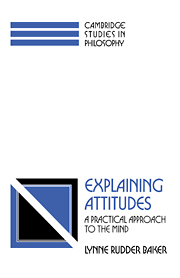3 - The myth of folk psychology
Published online by Cambridge University Press: 05 June 2012
Summary
Proponents of the Standard View divide into two camps: non-eliminativists, who set about showing how brain states can be beliefs, and eliminative materialists, who doubt that brain states can be coherently identified with particular beliefs, and hence deny that there are beliefs or other attitudes. By denying that there are any beliefs, eliminativists bypass the problems discussed in Chapter 2. The arguments for eliminative materialism, however, all depend on construing commonsense psychology as a kind of folk theory – dubbed ‘folk psychology’ – in competition with scientific psychology. Although I do not dispute anything eliminativists say about the scientific psychology that they envisage, I think that they are seriously mistaken about the nature and function of commonsense psychology: It is not a folk theory in competition with science.
The arguments for eliminative materialism proceed from a premise with which I am in sympathy to a conclusion I reject. From the premise
(S) Beliefs and other attitudes (attributed by ‘that’ clauses) will not be vindicated by a serious scientific psychology.
the eliminative materialist concludes:
(EM) There are no beliefs or other attitudes.
The truth of (S) depends upon the fate of a particular research program in psychology. If sentential theories, according to which beliefs are syntactically structured entities tokened in the brain, were supplanted by, say, certain kinds of neurophysiological or connectionist theories, which generalize over nothing describable as beliefs, then (S) would be established.
- Type
- Chapter
- Information
- Explaining AttitudesA Practical Approach to the Mind, pp. 67 - 90Publisher: Cambridge University PressPrint publication year: 1995



